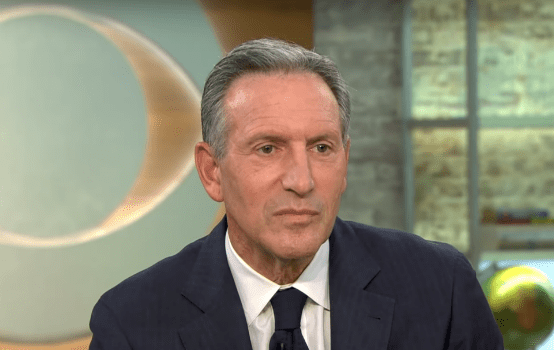Why the Democrats Hate Howard Schultz

Liberals are hoping former Starbucks CEO Howard Schultz wakes up and smells the coffee before he winds up re-electing Donald Trump.
Schultz is an unlikely target of the latest progressive two minutes hate. He ran a famously woke coffee chain that has been hailed as “the most progressive company in the world.” He has been a Trump critic, slamming the president’s Twitter habits as a sign of weakness and insecurity. He reportedly considered seeking the 2020 Democratic presidential nomination.
But the Democratic Party of Alexandria Ocasio-Cortez and $42 trillion in new spending over 10 years is no longer interested in Schultz’s quaint concerns over fiscal responsibility and paying for the entitlement programs we already have. Now is the time for Bernie Sanders’ socialism, not Paul Tsongas 2.0. So Schultz has shifted to “considering running for president as a centrist independent.”
This has Democrats boiling with rage. A heckler at a Schultz event said it best. “You’ll help elect Trump, you billionaire, egotistical asshole,” this clearly undecided voter shouted. “Go back to getting ratioed on Twitter. Go back to Davos with the other billionaire elite!”
“Go back to Davos” does not seem like an inspiring campaign slogan for a run against Trump and, presumably, a progressive Democratic presidential candidate. But many Democrats fear that given a choice between Trump and their party’s left wing, many suburban centrist voters—the types who helped make Nancy Pelosi speaker again—would find Schultz an attractive candidate.
American Bridge, a leading Democratic opposition research firm, and the liberal group Progressive Change Campaign Committee have already launched preemptive strikes against Schultz. “Our organizational mission is to defeat Donald Trump in 2020,” an American Bridge spokesman told the Washington Examiner. “If Howard Schultz decides to run as an independent and stands in the way of defeating Trump, we will oppose him at every turn.”
The impact of the last billionaire to run for president as an independent remains hotly debated to this day. Republicans blame Ross Perot for costing George H.W. Bush a second term in 1992. Democrats believed he split the anti-Bush vote, noting that Bill Clinton didn’t really catch on in the polls until after Perot temporarily dropped out of the race. Some exit polling suggests Perot took from Bush and Clinton equally.
What Perot indisputably did do is allow Clinton to win the White House while receiving just 43 percent of the vote. That’s an instructive figure, given that Trump’s floor appears to be in that range. His approval rating ranges from the high 30s to the mid 40s, with generic Republicans capable of tacking on a few more points in a competitive election. Anything that makes it easier for Trump to win a plurality with just these voters improves his path to re-election.
While Democrats have moved in a sharply different ideological direction than Schultz, they have become even more dependent on the votes of college-educated, affluent suburban voters who have been repulsed by Trump. It’s a shift that’s been going on since Clinton did well in the suburbs in the 1990s and Howard Dean morphed from a moderate Vermont governor to the progressive, anti-war hero in the 2004 Democratic presidential contest. But in 2018, Democrats were able to win even the suburban Atlanta district that had been held by Republicans since it was formerly represented by Newt Gingrich.
If, however, many millions of these voters end up voting for Schultz instead of the Democratic presidential nominee, Democrats could be in their biggest trouble since Ralph Nader challenged Al Gore’s left flank as the 2000 Green Party nominee. Nader’s impact, at least in the decisive state of Florida, is less controversial in Democratic circles than Perot’s.
Perot won 19 percent of the vote nationally. Nader was arguably able to swing an election with just 2.7 percent. Even Jill Stein, with barely 1 percent, was widely viewed as a spoiler.
Of course, the belief that the too conservative Republican Party and too liberal Democratic Party has created considerable demand for a centrist or moderate third party is stronger in theory than in practice. Gary Johnson did well for a Libertarian, building on a strong (by third-party standards) showing in 2012 to take more than four million votes against Trump and Hillary Clinton. But it is unclear which major party nominee he hurt more, and his success is hardly a sign of a huge outpouring of sympathy for a fiscally conservative, socially liberal candidate.
Populist Perot was closer to Trump 2016 than a centrist. He ran against the “giant sucking sound” of bad trade deals, though he was certainly more of a deficit hawk than the current president. Schultz might be more like Michael Bloomberg (who has warned him against running).
In several battleground states, the key swing voter is actually economically liberal but socially conservative. Many of them went for Trump in 2016. Their votes could be up for grabs next year, but probably not for Schultz.
The rage against Schultz in the absence of any real evidence of public support betrays a lack of confidence by Democrats that they can beat Trump—a weak incumbent who supposedly needed everything from a divided opposition to Russian interference in order to win the first time—except under ideal conditions.
W. James Antle III is editor of The American Conservative.
Comments